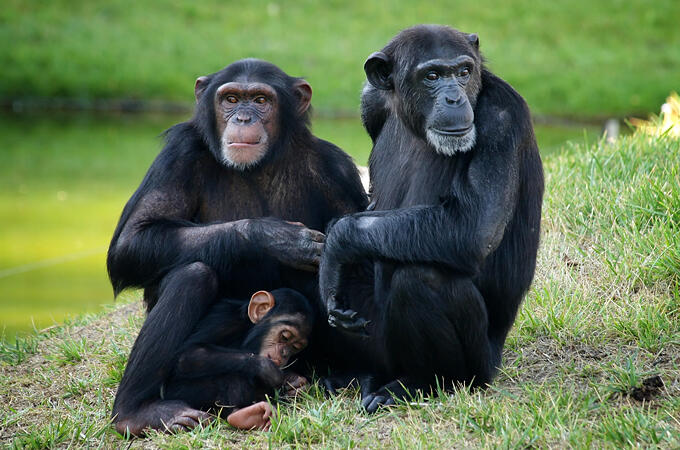Some people perform well when giving a presentation or participating in a public competition, while others are too nervous to do so. Then, do chimpanzees, which are most closely related to humans, worry about how they look to others? To investigate the effects of this in chimpanzees, a research team led by Doctoral Student Christen Lin at Kyoto University's Wildlife Research Center, Assistant Professor Akiho Muramatsu at Akita Prefectural University, and Associate Professor Shinya Yamamoto at Kyoto University's Institute for Advanced Study, recorded six animals' performance on three numerical cognitive tasks with different levels of difficulty and cognitive demand in the presence of different audience member compositions over 6 years. The results showed that the chimpanzees' performance was influenced by the number and type of audiences. Performance increased for the most difficult task as the number of experimenters increased, while performance decreased for the easiest task as the number of familiar audiences increased. The study was published in iScience.

The research team analyzed the numerical task performance of six chimpanzees residing at the Primate Research Institute. They are famous as the "chimpanzees who learned numbers" and perform various types of cognitive tasks every day. They frequently have visitors from home and abroad. For three of the numerical tasks that they have been performing for a long period, the research team examined whether their performance over 6 years in a total of 9,219 sessions (50−90 trials per session) was influenced by the type and number of visitors.
They found that the chimpanzees' performance increased with the number of experimenters for the most difficult task. The task was to quickly memorize multiple numbers that appeared in random locations on the screen, and when the chimpanzee pressed the first number, the remaining numbers were immediately hidden.
The easiest task was pressing the multiple numbers on the screen in ascending order. For this task, the chimpanzees' performance decreased as the number of experimenters and familiar audience increased, but it did not change significantly in the presence of an unfamiliar audience.
This study is particularly unique in that the effects of an audience on cognitive performance were quantitatively examined in non-human animals. Humans worry about how they look to others. Reputation can make humans behave more politely and sometimes even altruistically. The audience effects also constitute an important foundation of cooperative human societies. The fact that chimpanzees also worry about the audience, particularly those watching them, suggests that this characteristic may have emerged in non-human primates before the development of reputation-based human society.
Yamamoto said, "Researchers in the field often said to each other, 'The chimpanzees are very motivated when a TV crew is around.' The results were not so simple, but we could empirically show the audience effects in chimpanzees. Moving forward, I would like to continue to explore why chimpanzees worry about how they look to others, what would happen if audience members were chimpanzees, and whether these audience effects are observed in other animals as well."
Journal Information
Publication: iScience
Title: Audience presence influences cognitive task performance in chimpanzees
DOI: 10.1016/j.isci.2024.111191
This article has been translated by JST with permission from The Science News Ltd. (https://sci-news.co.jp/). Unauthorized reproduction of the article and photographs is prohibited.




